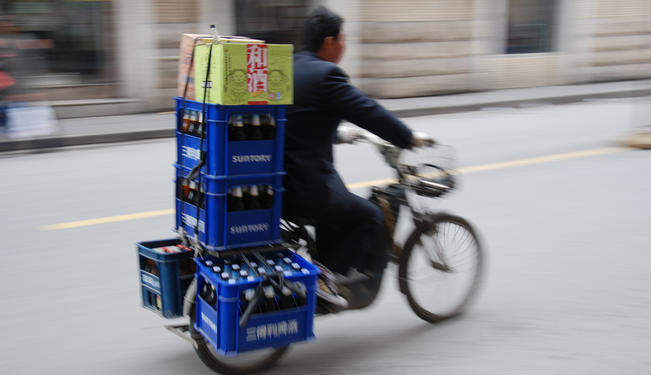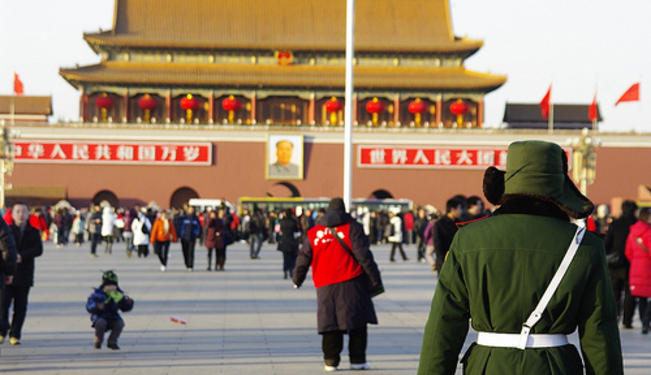As China maneuvers to maintain its competitiveness and further advance its economy, it is confronting myriad bottlenecks and inefficiencies that are drags on growth.
One of the most daunting and costly obstacles is the issue of logistics. Overall logistics costs in China — the price of moving goods and materials — take up about 18% of the country’s GDP. That compares with about 10% for many developed economies. There is clear room for improvement, but for political reasons, the topic is rarely addressed openly.
China’s logistics industry suffers from the same troubles found in many of its industries. It is fragmented, with legions of logistics providers, from self-employed couriers to big trucking and shipping companies. It is also regionally controlled and diversified, with each locality determined to protect its own interests, often to the disadvantage of the wider economy. “China is one country, but it is regionally diversified. There are a lot of regional protections, and that creates inefficiency,” says Chee Wee Gan, a principal and transportation and logistics analyst at A.T. Kearney in Shanghai. The regional differences make it harder to consolidate the industry, slowing the modernization of warehouse management and trucking, and also the automation of cargo handling, he adds.
As a case in point, the recent boom in online shopping has prompted many people to set up express delivery companies to serve them. Many delivery outfits are just one man with a bike and cell phone. E-commerce and TV shopping firms complain about the lack of reliable and fast delivery companies. “In the U.S., you can get something delivered tomorrow almost anywhere, and it is not expensive,” says Robert W. Roche, chairman of Acorn International, a Shanghai-based, NYSE-listed TV direct sales company. Roche, whose company also has operations in hyper-efficient Japan, says it takes longer to deliver goods in China than anywhere else.
Despite the proliferation of delivery companies, industry analysts say the express delivery business cannot keep up with the rapid expansion of e-commerce. Logistics are slowing the development of online and TV shopping, prompting some big e-commerce companies to build their own delivery networks.
The China market is appealing to foreign logistics companies, despite legal and regulatory complications and intense competition, because it is so big and growing so fast, says Edward Tse, a senior partner at Booz&Co and chairman of Booz&Co Greater China, based in Hong Kong and Shanghai. Although most of China’s express delivery companies began operating in the mid-1990s, the market has grown to be the world’s third largest after the U.S. and Japan, at RMB 84.14 billion (US$13.35 billion) in 2011, up 20.2% from a year earlier.
E-commerce is proving to be a major driver of growth in delivery and logistics. China has 193m online shoppers, more than even the 170m in the U.S. and more than double of the number in Japan, according to “China’s Digital Generations 3.0: The Online Empire,” a report by the Boston Consulting Group issued in April. BCG predicts China will become the world’s largest online retail market by 2015.
Xu Yong, chief consultant of the China Express and Logistics Consulting Co., an online express delivery and logistics consulting company, expects the market to grow at a rate of over 20% compound annual growth in terms of revenues and over 25% CAGR in volume over the next five years. “There is a huge growing demand for online shopping,” he says. According to some industry forecasts, China’s express delivery market will overtake that of the U.S., at US$70 billion, by 2020. Tse says that even if foreign operators do not get a huge share, a small share of a large market like China is very attractive. “The other dimension they are looking at is the synergy between their domestic express businesses and their international business. You cannot just look at the domestic market, but you have to look at the two, total markets,” according to Tse.
‘Piecemeal’ Supply Chains
Despite the massive building boom of the past two decades, China’s road, rail, ocean and inland shipping and air cargo services are all poorly integrated, manufacturers and those working in the industry say. This means supply chains are often put together in an inefficient, piecemeal fashion. Partly for this reason, and also because each locality protects its own interests, the country has about 7,000 express delivery companies. “Road freight transport is very fragmented. There are about one million trucking companies in China, many with less than 10 trucks. The top 10 players have less than 5% of the market,” Gan says. While the postal service’s EMS and Shunfeng Express lead with about half of the market for express delivery, many very small players do only local city deliveries, he notes.
This impacts service across the board. If a customer needs to return an item, for example, it is difficult for the retailer to get the original delivery company to return to pick it up because that trip does not generate revenue. Sometimes, the delivery company is not the company in charge of collecting cash on delivery; another franchise does that. “The money flowing back and forth is too complicated for them,” he says.
There are some locally grown dependable national network express delivery companies, but so far, foreign companies like FedEx and UPS have managed to gain only a tiny share of the domestic market. Expanding beyond that would likely require huge investments. Since private Chinese express delivery companies compete by slashing prices for local delivery services, some foreign companies are instead withdrawing from the domestic sector and focusing on international services. DHL Sinotrans International, a 50-50 joint venture with China’s Sinotrans Air Transportation Development Co. Ltd., ended its loss-making domestic delivery business in July, selling it to Uni-top Industry Co., a tiny Chinese delivery company.
DHL of Germany had just acquired the company in 2009. “The withdrawal is due to the overly fierce competition in the domestic courier service,” DHL said in a statement. It added that foreign companies lack a cost advantage and are also facing uncertainties over revisions in the Postal Law that require foreign companies to reapply for permission to operate in the domestic express delivery business. DHL’s Chinese domestic units had lost RMB99.2m (US$15.75m) by the end of 2011.
FedEx Express, which began doing business in China in 1989, is the only foreign company doing Chinese domestic delivery. FedEx has provided that service since 2007 and is now reapplying for the right to continue that business as required by the revised Postal Law. “Prior to the passage of the 2009 revised Postal Law, there was no clear legal definition of ‘express’ in Chinese laws and regulations,” said an executive familiar with the situation. (Both FedEx and UPS refused interview requests by Knowledge@Wharton.) FedEx has about a 1% share of the domestic market, according to industry estimates. “The problem for FedEx is that they are very small in China,” says Gan. “They are very good, but their networks in the domestic market are not big compared with big local companies like Shunfeng.”
Dan Brutto, president of UPS International, said in March this year that the company applied for a domestic delivery license in late 2010 and anticipates approval soon, according to a Dow Jones Newswires report.
The revised Postal Law bans foreign businesses from investing in or operating domestic express delivery of letters, a provision aimed at ensuring Chinese companies can dominate the industry, analysts say. “They want home-grown leaders. The answer would be EMS and Shunfeng, rather than FedEx or UPS. I do not know how effective [foreign delivery companies] can be, or whether the government will allow them to get big enough in China,” said a foreign executive of a logistics company in China. Since letter deliveries account for 30% of the business as a whole, the issue is a big one. “With the Postal Law, it remains to be seen whether or not the environment would be conducive for foreign players to grow and become very big in China,” Gan of A.T. Kearney’s Shanghai office says.
Find a Niche
Most analysts believe foreign companies should not try to compete with China Post or local delivery companies but should find their own, high profit margin niche markets. “This market is so fragmented. Foreign players have to be very specific about what market they want,” says Jeffrey Wong, a logistics specialist and partner at KPMG’s Shanghai office. Instead of going head-to-head with China Post, they should focus on specific products such as guaranteed delivery times, and specific industries such as pharmaceuticals. “In that way, they can shape the market better for specific customer clusters,” he notes.
Japanese delivery company Yamato Transport took that approach in starting up a small parcel delivery service for the general public and corporations in Shanghai, beginning in January 2010, and in Hong Kong from February 2012. The company, known for its logo of a mother cat carrying a kitten, is trying to replicate the highly efficient, on-time “TA-Q-BIN” service it provides in Japan. “We provide such good service as designated time delivery and very careful handling of parcels,” says Minoru Noda, chairman of Yamato (China) Transport Co. “We are the only delivery company in Shanghai which does ‘cool takyubin,’ providing cold chain delivery to consumers. This is our strategic product.”
Some believe the big international express delivery players such as DHL, UPS and FedEx can make further inroads, if they try. “If they are really serious about gaining domestic market share, it could have a big impact on the local express delivery companies,” says Li Ruixue, a professor in the department of Business Administration at Hosei University in Tokyo. “Those international players could use the synergies with their international express delivery business and their accumulated know-how and experience to pose a serious threat to local express companies,” according to Li.
Local express delivery companies in China are all franchised, except China Post’s EMS and Shunfeng, and all provide the same simple delivery service, so they have to compete by lowering prices, Xu adds. “So they create a price war and are caught in a weird trap. Whoever raises the price dies first, and those who do not raise prices are waiting to die.”
Local express companies charge about RMB10 to send a less than one kg parcel from Shanghai to Beijing, taking two or three days. Fedex and Shunfen charge more than RMB20, but for next-day delivery. Such services are more suitable for impatient e-commerce customers, who may have to wait several days for deliveries if they live outside the first tier cities, Gan says.
China has only two companies with their own national delivery networks. The biggest, EMS China, was formerly owned by the State Postal Bureau but became part of China Postal Express & Logistics Co., a unit of the state-owned China Post Group, in 2010. The China Post Group is the largest integrated express and logistics service provider with the longest history of business operations and the widest coverage in China. EMS China has more than 200 processing centers nationwide and a network extending to all regions of China and over 200 countries and regions. “It certainly has the biggest networks, but [it is] usually a bit slower and poor on service,” Gan says.
The only real rival to EMS is Shunfeng, which holds about a 20% domestic market share and reported over RMB10 billion in revenue in 2010. Headquartered in Shenzhen, S.F. Express Group or Shunfeng, as it is known, was set up in 1993. It has expanded both domestically and internationally, with express delivery services to Korea, Japan, Singapore, Malaysia and the U.S. “Shunfeng is a very good company. They are very reliable, dependable and fast, but they are also expensive,” Gan says.
Short-term Solutions
Other major players include Shentong Express, Yuantong Express, Yunda Express, ZTO Express, Huitong Express, TTK Express and ZJS Express, which are all franchised. Meanwhile, e-commerce companies like Alibaba, 360buy and Dangdang are building their own delivery networks, though Xu says the costs are much higher than those of ordinary express delivery companies.
“Many e-commerce companies are frustrated at this point,” he says. “Over the long term, as those logistics and delivery companies mature, they could become more effective. Even Amazon in the U.S. would not do its own delivery. Such a strategy is only a short-term solution, says Gan, since building a national delivery network is costly and over the long term there is the inevitable decision over whether to open up one’s networks to other companies. “If it is your own network, at some point your volume may not be as big as that of someone who is doing deliveries for everyone else.”
Since rising costs for labor, land and fuel call for bigger scale, the industry should be headed for consolidation in the next five to 10 years, says Xu. “The companies with stronger brands, bigger scale of operations and bigger financial power will increase their market share. I expect there will be only about eight nationwide domestic delivery companies, while some of the others may become specialized delivery companies or those limited to a region or a city,” he says.
Given that practically every industry in China is fragmented, overcrowded and suffering from overcapacity, from ebikes and mobile phone sellers to car companies, the free-for-all in the delivery sector is unsurprising, says Tse of Booz&Co., who has over 20 years of experience in management consulting in China. “Everyone wants to set up his own company when they find some business where people are making money. They want to be part of it,” he says. “But only a few companies, like Shunfeng, are making money. Many small express delivery companies are not running sustainable businesses, he said. Even China’s huge demand may not be able to absorb the supply provided by more than 7,000 companies. “People are looking at the demand side of the delivery equation: e-commerce is growing, so there is more demand,” Tse says. “With so much competition, margins have come down quite a bit.”
Already, some companies are succumbing. Beijing-based Star Express, which launched in 2009, went bankrupt in March. “Within the next few years, those express delivery companies which customers do not value will be eliminated,” said Noda of Yamato Transport. “The competition will be much fiercer.”
How far the consolidation, which is already underway, will go remains to be seen. While some national networks and e-commerce companies are acquiring regional delivery companies, the industry is likely to remain somewhat fragmented, says Wong of KPMG. “It will take a long time to drop to triple digits from the current number (7,000) because of regional differences. [Smaller companies] have a role to play. The way they do business varies greatly from place to place. The customer base in Shanghai is different from that in Guangdong,” Wong says.
China’s still rudimentary logistics system is playing a pivotal role in knitting together those diverse customer bases, industries and regions. How well they will be integrated, and how efficiently they will operate, remains to be seen. As China’s growth slows, reducing the burden of inefficient logistics will become doubly important, analysts say. Pushing ahead with such politically difficult reforms will determine China’s potential competitiveness and resilience in the long run.
The views expressed in this article are the author’s own and do not necessarily reflect Fair Observer’s editorial policy.
*[This article was originally published by Knowledge@Wharton].
For more than 10 years, Fair Observer has been free, fair and independent. No billionaire owns us, no advertisers control us. We are a reader-supported nonprofit. Unlike many other publications, we keep our content free for readers regardless of where they live or whether they can afford to pay. We have no paywalls and no ads.
In the post-truth era of fake news, echo chambers and filter bubbles, we publish a plurality of perspectives from around the world. Anyone can publish with us, but everyone goes through a rigorous editorial process. So, you get fact-checked, well-reasoned content instead of noise.
We publish 2,500+ voices from 90+ countries. We also conduct education and training programs
on subjects ranging from digital media and journalism to writing and critical thinking. This
doesn’t come cheap. Servers, editors, trainers and web developers cost
money.
Please consider supporting us on a regular basis as a recurring donor or a
sustaining member.
Support Fair Observer
We rely on your support for our independence, diversity and quality.
Will you support FO’s journalism?
We rely on your support for our independence, diversity and quality.








